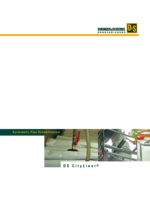The product
In the pipe rehabilitation with the DS City-Liner®, a PU coated needled felt tube is soaked with an epoxy resin, under defined conditions, in a mobile impregnation station at site directly before the installation and is then calibrated under control.
The field of application
The DS CityLiner process can be used in gravity and pressure pipes for almost all types of damage. The process is independent of the pipe material and cross-sectional shape of the sewer to be rehabilitated. As a rule, the application range extends to a nominal width of DN 200 to DN 800 with different inversion lengths of up to 300 m and more. In particular, performance curves with changes of direction and also sewage culverts can be rehabilitated with the arched liner system. Another advantage is the installation with open end. If the end chamber is not accessible, the CityLiner can be installed with an open end up to a diameter range of DN 600.
The installation
Before the inversion of the pipe liner, the pipe section to be rehabilitated is prepared using robot technology. Immediately before installation, hydrodynamic cleaning and a TV inspection are carried out. After impregnation, the hose is inverted into the prepared posture using compressed air or water pressure. Curing is done with the water used for inversion or with superheated steam for compressed air inversion. The result is a product whose standard and quality meet the high requirements of impregnation in the factory. In the last working step, a milling robot opens the existing connecting cable.
The mixing plant
The preparation of the needle felt hose takes place in the D&S CityLiner mixing plant. This is a mobile impregnation factory whose components have been optimally adapted to the process by DIRINGER & SCHEIDEL ROHRSANIERUNG. The PLC-controlled, fully automatic mixing plant operates as a closed system. The resin and hardener tanks have a volume of 3,000 kg. In this way, the constant resin temperature can be maintained independently of external influences. Defined resin and hardener quantities are transported via a controllable feed pump to the compulsory mixer, brought together under exclusion of air and then introduced into the vacuumed felt hose and calibrated. All system-relevant data is permanently documented and monitored by electronic measuring devices integrated by the system manufacturer. The components are calibrated in the manufacturer's specified cycle.
The advantages
The advantages of the mobile impregnation station are quite obvious: contrary to the other rehabilitation methods, where the tube is already impregnated when delivered to the site, this method provides a maximum flexibility. Unexpected incidences at site can be dealt with under control just as possible disruptions during the building progression, for instance, changes in dimension and mass.
And the transport of a non-impregnated inliner does not cause any logistic problems at all. An additional guarantee for customer and user is: the product holds the "Allgemeine bauaufsichtliche Zulassung vom Deutschen Institut für Bautechnik (DiBt)" (General approval for building supervision of the German Institute of Structural Engineering).
The product
The DS polyester liner is a needled felt tube impregnated with a polyester resin. After the transport of the inliner, manufactured and impregnated at the factory following defined quality standards, the tube is inserted by inversion into the prepared reach by means of water pressure. The heating-up of the water used during the inversion process causes the curing of the polyester resin system.
The installation
The procedure is suitable for the rehabilitation of defective pipelines in a nominal width range from DN 100 to DN 1 600. The result is a product, the standard and quality of which meets all the requirements concerning leak tightness, static bearing capacity and hydraulic flow properties.
![[Translate to English:] Diringer & Scheidel Rohr [Translate to English:] Logo Diringer & Scheidel Rohr](/fileadmin/media/logos/DuS_Rohr_GmbH_u_Co_KG.svg)
